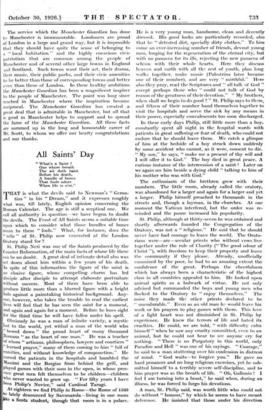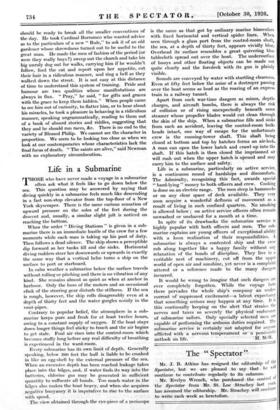All Saints' Day
" What's a Saint ? One whose breath The air cloth taint Before his death, A bundle of bones That fools adore When life is o'er."
THAT is what the devils said to Newman's " Gcron- tius " in his " Dream," and it expresses roughly what was, till lately, English opinion concerning the Roman Calendar. The age is still a sceptical one. We call all authority in question—we have begun to doubt the devils. The Feast of All Saints seems a suitable time upon which to consider what those bundles of bones mean to these " fools." What, for instance, does the " relic " of St. Philip now venerated at the London Oratory stand for ?
St. Philip Neri was one of the Saints produced by the Counter Reformation, of the main facts of whose life there can be no doubt. A great deal of intimate detail also was set down about him within a few years of his death. In spite of this information the figure of the saint is an elusive- figure, whose compelling charm has led disciple after disciple to attempt elaborate portraiture without success. Most of them have been able to produce little more than a blurred figure with a bright halo against a painstaking historical background.. Any- one, however, who takes the trouble to read the earliest lives will feel that he has seen the saint for a moment, and again and again for a moment. Before he loses sight for the third time he will have fallen under his spell. .
Obviously he was a man of infinite variety, a mystic • ost to the world, yet withal a man of the world who " bowed down " the proud heart of many thousand omans " as the heart of one man." He was a teacher of whom " artisans, philosophers, lawyers and courtiers " " learned prayer," many of them coming to him " full of enmities, and without knowledge of compunction." He nursed the patients in the hospitals and humbled the Massimi and the Borgias from behind the grill, and played games with their sons in the open, in whose pres- ence great men felt themselves to be children—children who never wanted to grow up. " For fifty. years I have been Philip's Novice," said Cardinal Tarugi. At eighteen we find Philip in Rome—the Rome of 1533 lately denounced by. Savonarola—living in •one room e a Scas student,- though that 'room is in a- palace. He is a very young man, handsome, clean and decently dressed. His good looks are particularly recorded, also that he " detested dirt, specially dirty clothes." To him come an ever-increasing number of friends, devout young men, longing for the regeneration of the eternal city, but with no panacea for its ills, rejecting the new panacea of schism with their whole hearts. Here they discuss heaven and earth with all the zest of youth, plan long walks together, make music (Palestrina later became one of their number), and are very " mirthful." Here also they pray, read the Scriptures and " all talk of God " except perhaps those who " could not talk of God by reason of the greatness of their devotion." " My brothers, when shall we begin to do good ? " St. Philip says to them, and fifteen of their number band themselves together to visit the hospitals and serve the sick by any means in their power, especially convalescents too soon discharged. In these early days Philip, still little more than a boy, constantly spent all night in the hospital wards with patients in great suffering or fear of death, who could not endure that he should leave them. We catch a glimpse of him at the bedside of a boy struck down suddenly by some accident who cannot, as it were, consent to die. " My son," he says, " make me a present of thy will and I will offer it to God." The boy died in great peace. A curious instance of the intercession of a saint ! Later on we again see him beside a dying child " talking to him of his mother who was with God."
The enthusiasm of the brethren grew with their numbers. The little room, already called the oratory, was abandoned for a larger and again for a larger and yet a larger. Philip himself preached to thousands in the streets and, though a layman, in the churches. At one moment the Vatican interfered, but the order was re- scinded and the pause increased his popularity.
St. Philip, although at thirty-seven he was ordained and shortly afterwards founded the Congregation of the Oratory, was not a " religious." He said that he should never have had courage to leave the world. The Orato- rians were—are—secular priests who without vows live together under the rule of Charity (" The good odour of ('heist "), with freedom to keep their property and leave the community if they please. Already, unofficially canonized by the poor, he had to an amazing extent the confidence of the great. Perhaps the cheerfulness which has always been a characteristic of the highest class in all countries appealed to him. He looked upon animal spirits as a bulwark of virtue. He not only advised but commanded the boys and young men who flocked to the Oratory to " enjoy themselves." The noise they made the other priests declared to be " unendurable." Even as an old man he would leave his work or his prayers to play games with them. This love of a light heart was not diminished in St. Philip by experience. He knew the terrors of life and hated its cruelties. He could, we are told, " with difficulty calm himself " when he saw any cruelty committed, even to an animal, but he could not bear to see anyone cry for nothing. " There is no Purgatory in this world, only. Paradise. and Hell " was one of his sayings. " Courage," he said to a man stuttering over his confession in distress of mind. " God waits—to forgive you." He gave no hard penances and no long religious exercises, yet he sub- mitted himself to a terribly severe self-discipline, and to him prayer was as the breath of life. " Oh, Gallonio ! I feel I am turning into a beast," he said when, during an illness, he was forced to forgo his devotions.
- A man, St. Philip said, was worth little who could not do without " honour," by which he seems to have meant deference. He insisted that those under his direction should be ready to break all the smaller conventions of the day. He took Cardinal Borromeo who wanted advice as to the particulars of a new " Rule," to ask it of an old gardener whose shrewdness turned out to be useful to the great man. He made the men of fashion of the period (or were they really boys ?) sweep out the church and take his big unruly dog out for walks, carrying him if he wouldn't follow, feed the cat and report upon her appetite, cut their hair in a ridiculous manner, and ring a bell as they walked down the street. It is not easy at this distance of time to understand this system of training. Pride and humour are two qualities whose manifestations are always in flux. " Pray," he said, " for gifts and graces with the grace to keep them hidden." When people came to see him out of curiosity, to flatter him, or to hear about his miracles, he took a pleasure in behaving in a ridiculous manner, speaking ungrammatically, reading to them out of a book of absurd stories and riddles, suggesting that they and he should run races, &c. There is no end to the variety of Blessed Philip. We cannot see the character in proportion. We seem to be looking too close as when we look at our contemporaries whose characteristics lack the, final focus of death. " The saints are alive," said Newman with no explanatory circumlocution.



























































 Previous page
Previous page